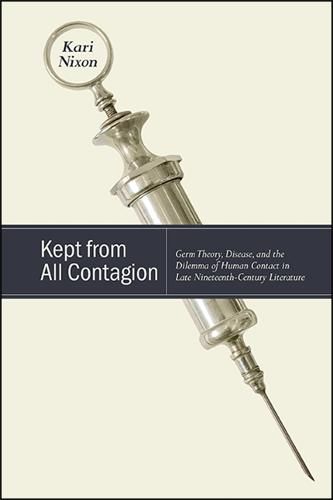Readings Newsletter
Become a Readings Member to make your shopping experience even easier.
Sign in or sign up for free!
You’re not far away from qualifying for FREE standard shipping within Australia
You’ve qualified for FREE standard shipping within Australia
The cart is loading…






This title is printed to order. This book may have been self-published. If so, we cannot guarantee the quality of the content. In the main most books will have gone through the editing process however some may not. We therefore suggest that you be aware of this before ordering this book. If in doubt check either the author or publisher’s details as we are unable to accept any returns unless they are faulty. Please contact us if you have any questions.
Kept from All Contagion explores the surprising social effects of germ theory in the late nineteenth century. Connecting groups of authors rarely studied in tandem by highlighting their shared interest in changing interpersonal relationships in the wake of germ theory, this book takes a surprising and refreshing stance on studies in medicine and literature.
Each chapter focuses on a different disease, discussing the different social policies or dilemmas that arose from new understandings in the 1860s-1890s that these diseases were contagious. The chapters pair these sociohistorical considerations with robust literary analyses that assess the ways authors as diverse as Thomas Hardy, Henrik Ibsen, and Mary Elizabeth Braddon, among others, grappled with these ideas and their various impacts upon different human relationships-marital, filial, and social.
Through the trifocal structure of each chapter (microbial, relational, and sociopolitical), the book excavates previously overlooked connections between literary texts that insist upon the life-giving importance of community engagement-the very thing that seemed threatening in the wake of germ theory’s revelations. Germ theory seemed to promote self-protection via isolation; the authors covered in Kept from All Contagion resist such tacit biopolitical implications. Instead, as Kari Nixon shows, they repeatedly demonstrate vitalizing interpersonal interactions in spite of-and often because of-their contamination with disease, thus completely upending both the ways Victorians and present-day literary scholars have tended to portray and interpret purity.
$9.00 standard shipping within Australia
FREE standard shipping within Australia for orders over $100.00
Express & International shipping calculated at checkout
This title is printed to order. This book may have been self-published. If so, we cannot guarantee the quality of the content. In the main most books will have gone through the editing process however some may not. We therefore suggest that you be aware of this before ordering this book. If in doubt check either the author or publisher’s details as we are unable to accept any returns unless they are faulty. Please contact us if you have any questions.
Kept from All Contagion explores the surprising social effects of germ theory in the late nineteenth century. Connecting groups of authors rarely studied in tandem by highlighting their shared interest in changing interpersonal relationships in the wake of germ theory, this book takes a surprising and refreshing stance on studies in medicine and literature.
Each chapter focuses on a different disease, discussing the different social policies or dilemmas that arose from new understandings in the 1860s-1890s that these diseases were contagious. The chapters pair these sociohistorical considerations with robust literary analyses that assess the ways authors as diverse as Thomas Hardy, Henrik Ibsen, and Mary Elizabeth Braddon, among others, grappled with these ideas and their various impacts upon different human relationships-marital, filial, and social.
Through the trifocal structure of each chapter (microbial, relational, and sociopolitical), the book excavates previously overlooked connections between literary texts that insist upon the life-giving importance of community engagement-the very thing that seemed threatening in the wake of germ theory’s revelations. Germ theory seemed to promote self-protection via isolation; the authors covered in Kept from All Contagion resist such tacit biopolitical implications. Instead, as Kari Nixon shows, they repeatedly demonstrate vitalizing interpersonal interactions in spite of-and often because of-their contamination with disease, thus completely upending both the ways Victorians and present-day literary scholars have tended to portray and interpret purity.